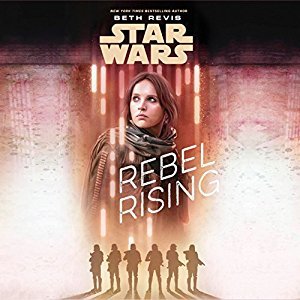Today I'm looking at a Star Wars book that talks about the life of Jyn Erso, protagonist of the film Rogue One which I just loved the ever loving daylight out of. Rebel Rising reveals Jyn's backstory in the missing years of the movie between when she's found by Saw Gerrera and when we meet her again on Wobani. This does fill in a bunch of details about Jyn's life and shows her being first a member of Garrera's resistance cell and later an independent forger. However, I think there are some issues with this book that show how the Star Wars franchise has changed in recent years.
Ultimately the biggest problem with this book is that it delves into the history of a character which we probably imagined in our heads in a way we liked better. But this is usually a problem when we get an origin story for a character we met more or less fully-formed. I'm reminded of The Shepherd's Tale from the Firefly 'verse. It could have been the greatest story ever written (although I have my own issues with it), but there are going to be a large number of people who are disappointed because they wrote their own story in their head that they'll always prefer. And I think we have this issue in Rebel Rising as well because this book will always make Jyn's backstory more limited than we could have imagined it to be. No matter how well Revis could have written Jyn's backstory it's going to be up against the reader's own imagination.
There's a trend I've started noticing in recent years that starts comparing the Rebels to terrorist groups and I'm honestly not sure what to think about this. First of all, this is definitely a reflection of our collective experience in the twenty-first century in which terrorism is a regular concern, as well as our awareness that the line between freedom fighters and terrorists can depend on where you stand. And don't get me wrong, Garrera's resistance cell does engage in at least one act of terror within the book where Garrera's group assassinate a newly installed Imperial governor. Instead of just targeting the governor, Garrera and his allies bring about twenty something flechette launchers and fire them directly into a crowd. So not only do they take out the Imperial governor and his bodyguard of stormtroopers, but they kill the local head of state for the planet, dignitaries, local nobility, and who knows how many bystanders. Garrera states the purpose is to strike fear into the Empire and people who support it, but I feel like it would significantly undermine his own cause by randomly killing civilians who are very clearly not thrilled about having an Imperial presence on their planet.
Another reason this concerns me is because I have seen recently on the internet some people who dismiss the Rebellion as nothing more than a murderous band of terrorists and come to the conclusion that the Empire Did Nothing Wrong. Which...okay, this is kind of a big issue for a couple reasons. First, it's a little simplistic to say that because one side is bad, the other side automatically must be good, ignoring the possibility that both sides are bad or both are good or more likely everyone's a mix of the two and there are no easy answers. Unfortunately by introducing darker, morally ambiguous aspects to the Rebellion people seem to be taking the Empire's side and it bothers me for a number of reasons. First, the Empire practices slavery and if you don't see the problem with that we need to have a long talk I don't want to get into here.
Second, the Empire practices rule through military force and terror, which ultimately becomes absurdly inefficient. This is something that I noticed in this book in particular. Jyn spends a lot of her time kicking around distant backwaters on the Outer Rim which have limited strategic or economic value but the Empire is absolutely determined to set up a garrison everywhere it can and is quite frankly ridiculously inefficient. Police states are prohibitively expensive and you spend so many resources on making sure stormtroopers are on every street corner and TIE fighters are patrolling every sky that you lose more resources than you could possibly gain through total galactic control. Yet I've recently seen people embracing this as an idea worthy of emulation and I find it...distressing on a lot of levels.
There have been other books about figures like Janek Sunber who are on the Imperial side but aren't necessarily bad people. At least, they're not the cackling villains that some Imperials tend to be, instead portraying people loyal to the Empire as complex individuals with their own motivations. This book simply doesn't do that. All the Imperials we meet fall into the cruel, ruthless, or potentially cackling villain categories which we've seen before. So it severely undermines Revis's attempt to cast the conflict between the Empire and the Rebellion in shades of grey instead turning it into a case of grey and black.
I think I can appreciate the attempt to make the Star Wars universe more complex and morally ambiguous, but this book just falls short of the mark. Jyn ends up hating both sides because she sees them as destructive forces, which leaves us in a dark and hopeless galaxy which I feel just goes against the essence of Star Wars. While Garrera and other rebels are depicted as less than heroic, the Empire is as bad or worse and I don't know if I like that feeling. I'll give Revis credit for trying, but I don't think I quite like the result.
- Kalpar


No comments:
Post a Comment